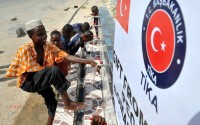News
22 March 2013TİKA's Water Projects
In different places in the world, but especially in Africa, people are faced with difficulties in finding clean and healthy drinking water due to geographical conditions, long periods of draught, lack of infrastructure and difficult social and political situations. When economical difficulties are added on top of all these, issues such as access to clean water becomes a great difficulty for people. The provision of water and water hygiene comprise an important issue for the development assistance sector. In this context, the wells that have been dug in Africa and Middle Eastern countries and the efforts made in farming irrigation in Central Asia and the Balkans by the Turkish Cooperation and Coordination Agency Directorate (TIKA), are literally giving life to civilization on three different continents.
In 1993, March 22nd was declared by the United Nations to be World Water Day. Since this day many efforts have been made by international organizations and non-governmental organizations to increase awareness about water throughout the world. Water is one of the basic requirements for individuals to be able to sustain life and develop civilizations. With global warming, the contamination of water sources, unplanned growth and the shrinking of water sources, problems in accessing usable and drinkable clean water have increased and the concept of “Water deprivation” has become a current issue.
According to UN data the difficulties of on average 1 billion people in the world for accessing clean water continues to grow. 2 million people, especially children, die every year due to polluted drinking water and the lack of sanitary infrastructure. The projects that TIKA has brought to life in the regions of its operations, and Africa in particular, to provide a solution to water and water hygiene-related problems being experienced in a variety of areas, are continuing at top speed.
The work that TIKA conducts in the field of water and sanitation can mostly be gathered under two main headings
1- Well digging projects being conducted in rural areas to provide health drinking water.
2- The improvement of water distribution networks towards providing healthy access to drinking water and maintaining water sanitation.
Africa
The problem in this area, which despite the world’s advanced technology still continues to be a serious issue, is being worked on by TIKA to be reduced to a minimum in the regions of its operations. In this context, TIKA is conducting important well-digging work in African countries like Nigeria, Ethiopia, Sudan, Burkina Faso, Mali, West Africa and Somalia, where this problem is most urgently in need of attention. Through TIKA’s 8 Program Coordination offices in Africa, a variety of projects have been put into application on a regional and countrywide basis in line with the needs of the community, with drinking water being the top priority. In this scope, a total of 303 water wells – 80 in Nigeria, 27 in Ethiopia, 41 in Sudan, 78 in Burkina Faso, 30 in Mali, 30 in West Africa and 17 in Somalia – have been established by TIKA. In addition, 19 Deep Drilled Wells have been provided for service as part of the Somalia Clean Water Access Project and water tanks, distribution networks and fountains have been facilitated at various locations. The Somalia Deep Drilled Well project, which was realized through collaboration between TIKA and DSI, has provided for the needs of 126 thousand people in the area. In Ethiopia’s Shinille Region a reservoir and caisson well was built in response to the water problem and presented to the service of the Ethiopian people.
Palestine
TIKA’s work, which is not limited to the African countries, also continues in the Middle Eastern region. Within this scope TIKA has constructed a pipeline and pumping station in Beyt Lahiya to renew the water and sewage infrastructure of the Beyt Lahiya, Deyr El-Balah, Han Yunus and Refah municipalities which had been seriously damaged during the internal conflicts that have taken place in the area. A total of 5 thousand 509 meters of piping was installed in Deyr El-Balah, Han Yunus and Refah.
TIKA, while continuing to work towards solving water problems in all the areas of its operations, has constructed a sewage pump station in the El Balah region of Vadi El-Salka, west of Deyr El-Balah. Due to this area being relatively lower than normal levels, the wastewater that had collected here was becoming a problem for the people in the area, especially during the winter months. With this project the wastewater is collected at the lowest point and then pumped through the newly established system to the main treatment station.
In addition to the aforementioned projects, TIKA initiated 18 different projects, including 15 water wells, 22 km of pipeline installation, the repair of wastewater lines and the construction of rainwater collection networks towards repairing the infrastructure that was damaged by war in the Gaza Strip, by collaborating with the Palestine Coastal Municipalities Water Administration. These efforts were aimed to provide the people in the region with clean drinking water to improve public health and environmental conditions and contribute towards staying ahead of water pollution and epidemics caused by contaminated water.
TIKA also established 10 saltwater purification units throughout Gaza. The water purification units contributed to solving the clean water problem which is one of the most important issues among the Gaza residents. After the saltwater is purified in the 10 centers established by TIKA it is planned to be distributed by 7 tankers among 340 schools throughout Gaza. In this way nearly 600 thousand students will gain access to clean water.
Water distribution networks and wells were constructed in the Aydamon, El-Kuaşra and El-Birre Districts.
In order to respond to the water shortage problems in the Aydamon, El-Kuaşra and El-Birre Districts, a project was developed by the Northern Lebanon Water Administration and TIKA. An agreement was made with this project to construct water distribution networks in the villages of Aydamon, Kuaşra and El- Birre, water wells in Aydamon and Kuaşra and a water tank in Aydamon. Within the scope of this work 40 thousand square meters of water lines were installed. The projects were prepared in accordance with the İller Bankası standards and water hydrants were installed at important points such as main roads and schools.
Pakistan
There are problems in accessing drinking water in almost all of the regions of Pakistan. As in most of Pakistan, but especially in the Swabi and Çarsada regions, water concerns have been solved to a large extent. In 2012, 40 water wells were established with the support of TIKA within the scope of the project to build 40 Mechanical pump water wells in the Khyber Pakhtunkhwa region of Pakistan. A total of 21 villages benefited from the project in the Swabi and Çarsada region.
In the region of Tank, which was heavily impacted by the flood disaster of 2010, 40 wells were constructed to respond to water problems in the various surrounding villages, and presented for the use of people living in the Tank area.
TIKA, which has realized important drinking water projects in Africa and the Middle East, generally works on projects concerning agricultural irrigation in the Balkans and Central Asia.
Bosnia-Herzegovina
Vlasinje, located in the Federation of Bosnia and Herzgovina Central Bosnia Canton and known for its history and beauty, is home to nearly one thousand two hundred residents. The population of Vlasinje, which is 15 km from the city center of Jajce, is almost completely comprised of “refugees” who fled their homes during the 1992-95 war and later settled in the area. In the project which was established in order to bring drinking water to the community of Vlasinje, the opening of the fountain was conducted by Prime Minister Recep Tayyip Erdoğan in 2012 over video conferencing.
Azerbaijan
As part of the TIKA Azerbaijan Government Program, a decision was made to establish special pilot agricultural operations in a 4,800 hectare area of the Ağcabedi and Beylagan regions in order to bring the wheat harvest, being planted in the area for bread production, to a sufficient form. A committee comprised of highly specialized experts from TIGEM made analyses of the area where the pilot project will take place, under the coordination of TIKA. The project concerns planning and project work in addition to high pressure water systems in the specified area.
Georgia
In 18 different villages of Georgia, wells were drilled to provide access to healthy drinking water.

